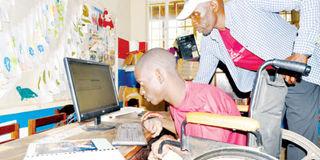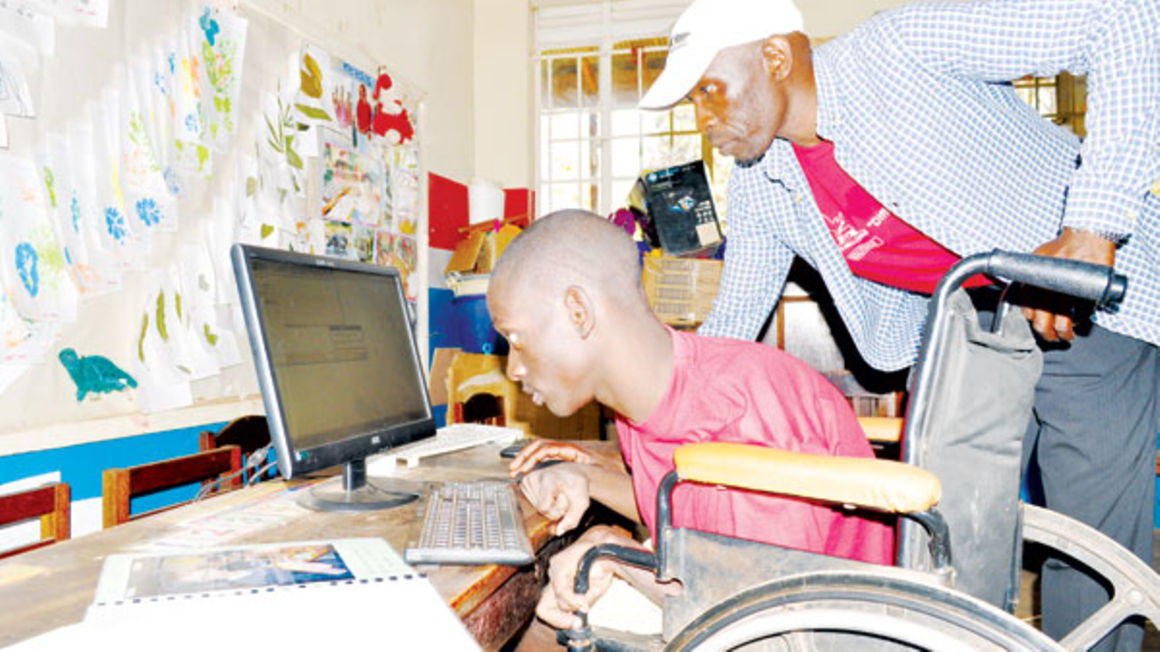Learners with disability to be assessed differently

A child with special needs learns computer in Kampala. Special Needs students post better UCE results 2022. PHOTO | FILE
What you need to know:
- Special needs and inclusive education remain a challenge for the education sector. However, there are efforts to see that special needs learners get better assessment.
The Special needs and inclusive education department at the Ministry of Education and Sports proposed a different assessment method for learners with special needs instead of the mandatory writing of national exams like their able bodied counterparts.
The Ugandan education system calls for one to at least have Primary Leaving Examination credentials as an average document but some learners would never sit for these exams because of disability.
During the national sensitization on inclusive education policies and access to information by persons with disabilities in Uganda at Kibuli Core PTC, Sarah Bugoosi Kibooli, the Commissioner for Special needs and inclusive education at the ministry said that they plan to adjust system to ensure that everyone is catered for.
In Uganda, there are about 2.8million learners with disabilities but only 50,000 of these are in school because there are not so many specialized schools. There are only 24 special needs schools in the country and only 126 ordinary schools are inclusive to accommodate special needs learners.
New policy
In the new policy, students with cognitive disabilities will be exempted from sitting for national exams at the different stages of education and instead be assessed according to their abilities and skills.
Kibooli said, “There are some special needs children who can achieve their dreams and career path the academic way and these will be allowed to sit for final exams. However, the learners with cognitive disabilities should not be compelled to sit for these exams. We will be assessing them according to their particular interests and skills from which they would be able to earn from and depend on for their livelihood.”
Sarah Ayesiga, the assistant commissioner for inclusive and non-formal education said the ministry is developing a different assessment system and stopping the thought that all children should have standardized assessment.
She says, when these learners fail in the normal exams it does not mean that they have failed in life because there are lots of things such children can get involved in.
“The children with special needs may not be able to compress the work studied in four or seven years in just a few hours. Some children with cognitive disabilities may not be able to sit in class for over 30 minutes because of their disability but have particular interests and skills where they are very perfect,” Ayesiga said.
The curriculum will also be changed to focus on competences and skills in which learners can be trained, assessed, and become qualified.
As we prepare to reopen schools, Ayesiga said, “We are training teachers at all levels of education so that at a time when they have a child with special needs, they are ready to receive them and know what to do. Each teacher in this country should have the basic skills to handle a child with special needs.”
She also adds that special needs schools are going to be vocationalised in order to help the learners with disability to earn skills like carpentry and joinery, cooking, tailoring and many other skills where they can earn a living.
Why inclusive education?
As the schools reopen, the ministry, following the SDG4, wants to improve on inclusiveness for learners with disabilities. Bugoosi Sarah Kibooli, the commissioner special needs and inclusive education at the ministry, says all schools should be inclusive to cater for children with intellectual, visible and invisible disabilities such as orphans, street children, refugees, teenage mothers, deaf and blind to remain in school.
“Schools should be able to cater for the needs of all students including those with special needs. When the normal students got their home study material, the learners with disabilities also got but the challenge was that they needed the guidance from the special needs teachers who could not be everywhere,” she says.
The number of learners with disability in pre-primary schools is not known because many of these children start school late since a lot of time is spent in treatment. There are 7,682 learners with disability in primary schools that are getting support from the government and 115 in secondary schools.
At the tertiary institution and university level, the number of learners with disabilities is not known since many of them go into vocational training.
There is an affirmative action that was decided that every year, universities should take on 64 students with disabilities on government sponsorship. The students’ loan scheme according to Kibooli also includes the category of learners with disabilities as well as teachers going for special needs education.
The challenges
Save for Kenya, the text books and many learning materials available for learners in Uganda are in print which is not convenient for the learning of the special needs children.
Kibooli says, “We are introducing assistive digital technologies such as MP3 player, vector reader and flash discs to make the content in the textbooks consumable for these learners but they need guidance from special needs teachers who cannot be everywhere.”
There is a shortage of specialist teachers and facilities, low basic digital literacy of the teachers to facilitate inclusive education. Classroom arrangement, size and management and low government investment in digital education are all a hindrance to the learners with special needs.
Ayesiga says, “Braille machines, paper, sign language dictionaries, wheel chairs, hearing aids, glasses and other assistive devices and equipment that are needed by the learners with special needs are still expensive and unaffordable to some parents.”




